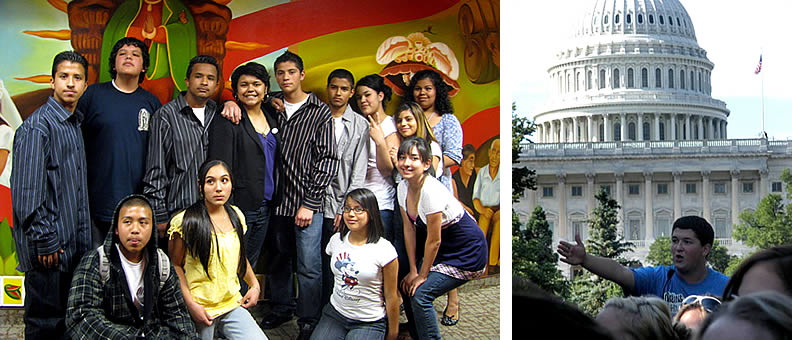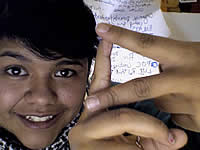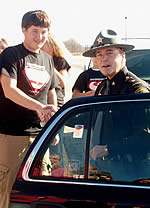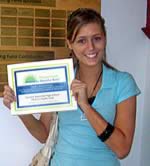
PROFILES
Colorado Organization for Latina Opportunity and Reproductive Rights (COLOR)
Denver, CO
by Laura Cockman, 17, Y-Press
Mimi Madrid, 21, first became involved with COLOR, the Colorado Organization for Latina Opportunity and Reproductive Rights, in high school. Fast forward a few years, and she is the Youth and Reproductive Justice Programs Coordinator for the organization, founded in 2000 in Denver.
 COLOR focuses primarily on sexual education and reproductive justice for young Latinas. Members and staff give presentations on health at local high schools and create workshops for youth, such as the Latina Health Summit on Oct. 10 in Denver. That day, young Latinas and their families will gather to hear guest speakers and discuss health and reproductive issues.
COLOR focuses primarily on sexual education and reproductive justice for young Latinas. Members and staff give presentations on health at local high schools and create workshops for youth, such as the Latina Health Summit on Oct. 10 in Denver. That day, young Latinas and their families will gather to hear guest speakers and discuss health and reproductive issues.
Madrid hopes to continue using a positive influence and comprehensive sexual education to lower the numbers of health problems in society today. “Sexual education is necessary,” she said. “If more young people would love their bodies the way they are, I feel like there would be so much more love and so much more responsibility.”
What are the benefits of educating teens through their peers rather than adults?
It just makes sense. When you hear advice from someone who has gone through it and looks like you and talks like you and knows where you’re coming from and doesn’t judge you, of course you’re going to listen. You’re going to be like, “Oh, that’s really true.”
When education is being done by peers, there’s no judgment. There’s more trust, and there’s more confidence, and there’s more understanding of where that person comes from. So, yeah, I can look up to an adult, but if there’s a young activist out there and he or she is doing amazing work, then I could be like, “Yeah, I can do that, too. I can make a change in the community, because my friend, who’s the same exact age that I am, can do it. Why can’t I?”
What are the benefits of sexual education to society?
I think that we are sexual human beings. And right now, how the environment is, we see sexuality as this embarrassing, shameful, bad thing. And so if we educate our society about sexuality, then I feel that there would be more empowerment in sexuality. I feel like there would be less of a lot of things: There would be less unwanted pregnancies, there would be less sexually transmitted infections.
What has been your biggest challenge?
I think one of the biggest challenges that we face – me and my coworkers and the young people who I work with – is there’s a lot of ageism. So because we are so young, people are like, “Really? What are you doing here?” or “Oh, you don’t have enough experience,” or all these different things. So I would say sometimes ageism and I also feel that something that comes up is that we are so young that sometimes we forget to relax and breathe and, you know, have fun sometimes.
What one piece of advice would you give to other kids who want to get involved with health activism?
I would say start small. If you have text, just send a text message about information to someone. Or you can help someone relax or, you know, take a friend out for a walk. I think those are the little things that really matter. I would also say that they can volunteer at organizations. Volunteering is one of the best things to do if you want to change the world.
Also, you have to start with a change inside. You have to change yourself if you’re always second-guessing yourself or just thinking, “I’m not that pretty. I’m not that smart.” You know, change that from within and be like, “Yeah, I’m beautiful, I’m smart, I’m intelligent,” and then pass it on to your friends, to other people.
Students Against Destructive Decisions (SADD)
Nationwide
by Julie Kippenbrock, 16, Y-Press
Students Against Destructive Decisions is a nationwide organization all about “teens helping teens make positive decisions.” With 350,000 students composing 10,000 chapters across the country, SADD works with other non-profit organizations to spread awareness of a variety of destructive decisions such as reckless teen driving, suicide, drug use, tobacco use and eating disorders.
 Recently named SADD National Student of the Year, Ricky Birt, 18, of New Carlisle, Ohio, has been involved in SADD for four years. “We work through teens at various places across the country to really promote a positive lifestyle in terms of no use of substances and to help teens have more power to make a difference,” he said.
Recently named SADD National Student of the Year, Ricky Birt, 18, of New Carlisle, Ohio, has been involved in SADD for four years. “We work through teens at various places across the country to really promote a positive lifestyle in terms of no use of substances and to help teens have more power to make a difference,” he said.
What project are you currently working on?
At the state level, I work with almost 500 chapters here in Ohio, and we’re actually launching a campaign in November called “Lights for Life.” Drivers will drive with their headlights on at the end of November as a pledge to be responsible drivers each time they take the wheel. And then what we do is we created kits that give different activities to do throughout the week and empower students to connect with their local law enforcement, get them on board, as well as contact local elected officials to get proclamations and work through their local community to get the message out.
How did you get involved with SADD?
When I was in high school, I thought there were a lot of different ways to get involved. There was choir and all these groups, but when I came to the SADD table I saw something very unique. It wasn’t a national organization telling students what to do in a specific agenda, as I find in a lot of other organizations, it was a group of teenagers from my high school who were really concerned about their friends and the decisions they were making. I saw that they were trying to prevent drunk driving, drug use, tobacco usage, things that we had seen in our community where people had made those decisions to use and the dangerous consequences that came about. I felt through SADD I could actually make a real difference to my friends and I could really help others make positive choices and help, in the end, to save their lives.
What do you consider SADD’s biggest success?
Fewer students are dying than ever before on the roadways of America because we’re relentless in our message that you should be responsible drivers when you take the wheel. But actually, probably the biggest success is when we get SADD students together and we ask them the same question that you asked me — Have you seen SADD make a difference in your life? — and overwhelmingly you see that SADD empowers students, not just to help their friends make better decisions, but they actually become stronger individuals because of their involvement in SADD.
The PEACH Club
Doherty Memorial High School,Worcester, MA
by Danielle Hensley, 13, Y-Press
 Fawna Racine, 19, went from almost dropping out of high school to creating her own group, finding her own voice, and making her own mark on her school.
Fawna Racine, 19, went from almost dropping out of high school to creating her own group, finding her own voice, and making her own mark on her school.
Fawna is a health activist. She worked for nutritional health and physical fitness programs at her high school before graduating. She’s spoken to legislators, addressed a conference by the Centers for Disease Control and Prevention, and spread her message online.
Action for Healthy Kids, a partnership of more than 60 national organizations and government agencies in pursuit of health and wellness, supports the PEACH Club – Promoting Exercise And Continuing Health – which she started because she “kept getting denied from high school clubs, so I made my own.”
The PEACH Club is the first health club at the school. The club works to change the policies of the school so more nutritional needs can be met and more exercise programs can be put into place. It also tries to inform students about general information for good health.
What is your definition of youth activism?
Pretty much I would say where the youth pretty much take initiative over the adults and really to show their colors and really put into progress certain things that they’re trying to achieve.
What’s been your biggest challenge in your efforts in health activism?
Let’s see. Trying to get around the policies, ’cause it’s really hard, and just trying to get people to see that they can trust the youth and it’s not a bad thing to let us run the show sometimes.
What do you consider your biggest success?
Probably going from dropping out of high school to establishing my own group and my own voice.
What piece of advice would you give to other kids interested in health activism?
I would probably say step out of the box. Don’t let fear take over, and don’t worry about what other people have to say. Do what you need to do to better yourself, and if you think it’s something that could help other people, why not do it? Don’t bite your tongue too hard because it’ll always make it bleed and that’s never good. So always speak your opinion.




